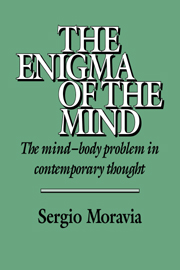Book contents
- Frontmatter
- Contents
- Preface to the English edition
- The enigma of the mind
- The enigma of the mind: Introduction to a metaphor
- 1 Toward a physical science of the mental: Feigl and the (re-)construction of the ‘mind–body problem’
- 2 The apogee of physicalism: The identity theory and materialism in the Australian school
- 3 The obscure relationship: Problems and debates surrounding the identity theory
- 4 Psychology as alchemy: The elimination of the mental in the ‘disappearance theory’
- 5 The mind as function: The functionalist approach to the mind–body problem
- 6 The mind as property and as event: The ‘reformist’ neo-identityism of Kim and Davidson
- 7 The mind as language: The linguistic turn in the mind–body problem
- 8 Speaking in many different ways: The pluralization of descriptions and explanations in the MBP
- 9 The mind as a mode of subjective experience: An interpretive model of the features of the mental
- 10 The mind as ‘subject’ and as ‘being-in-the-world’: Toward a non-mentalistic interpretation of the mental
- Appendix The mental as intentional/‘personal’ emergence: The psycho-personological perspective of Joseph Margolis
- Bibliography
- Name index
10 - The mind as ‘subject’ and as ‘being-in-the-world’: Toward a non-mentalistic interpretation of the mental
Published online by Cambridge University Press: 05 June 2012
- Frontmatter
- Contents
- Preface to the English edition
- The enigma of the mind
- The enigma of the mind: Introduction to a metaphor
- 1 Toward a physical science of the mental: Feigl and the (re-)construction of the ‘mind–body problem’
- 2 The apogee of physicalism: The identity theory and materialism in the Australian school
- 3 The obscure relationship: Problems and debates surrounding the identity theory
- 4 Psychology as alchemy: The elimination of the mental in the ‘disappearance theory’
- 5 The mind as function: The functionalist approach to the mind–body problem
- 6 The mind as property and as event: The ‘reformist’ neo-identityism of Kim and Davidson
- 7 The mind as language: The linguistic turn in the mind–body problem
- 8 Speaking in many different ways: The pluralization of descriptions and explanations in the MBP
- 9 The mind as a mode of subjective experience: An interpretive model of the features of the mental
- 10 The mind as ‘subject’ and as ‘being-in-the-world’: Toward a non-mentalistic interpretation of the mental
- Appendix The mental as intentional/‘personal’ emergence: The psycho-personological perspective of Joseph Margolis
- Bibliography
- Name index
Summary
PERPLEXITIES ABOUT MENTALISM AND ‘CARTESIANISM’ IN THE CONTEMPORARY PHILOSOPHY OF MIND
The portrait of the mental that emerges from the collaborative effort reconstructed in the preceding chapter is undoubtedly innovative and suggestive. For many philosophers of mind the features attributable to the sensory, intellective, and conscious universe of man constitute a dimension of the human world at once autonomous and different from that of the bodily. Correspondingly, there seems to be a discipline, a ‘discourse’, relative to that universe characterized by its own irreducible peculiarity. The claims advanced by the identity and eliminationist camps tending in various ways to penalize this discourse now appear to be even less valid than before. It also appears that the knowledge relative to this peculiar ‘human’ universe can and must be legitimately articulated into distinct cognitive spheres: spheres that, although certainly not in conflict, are accessible to non-coincident types of investigation implying distinct procedures and goals.
It must be pointed out, however, that not all the philosophy of mind committed to rethinking the mental in non-physicalist terms is completely satisfied with the new characterization of the mental we have described above. It is not merely a question of a difference of opinion concerning this or that aspect of the mind, or of its cognitive experience. Nor is it a question of adjusting the picture by adding or subtracting other marks of the mental.
- Type
- Chapter
- Information
- The Enigma of the MindThe Mind-Body Problem in Contemporary Thought, pp. 236 - 266Publisher: Cambridge University PressPrint publication year: 1995



